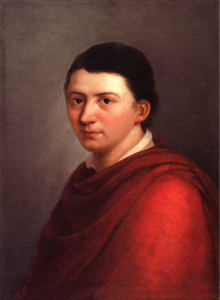The birds
(Poet's title: Die Vögel)
Set by Schubert:
D 691
[March 1820]
Part of Schlegel: Abendröte (putative cycle)
Wie lieblich und fröhlich,
Zu schweben, zu singen,
In glänzender Höhe
Zur Erde zu blicken!
Die Menschen sind töricht,
Sie können nicht fliegen.
Sie jammern in Nöten,
Wir flattern gen Himmel.
Der Jäger will töten,
Dem Früchte wir pickten;
Wir müssen ihn höhnen,
Und Beute gewinnen.
How lovely and enjoyable it is
To hover about, to sing
In the glowing heights,
To look down on the earth!
Humans are foolish,
They cannot fly,
They complain when they are in difficulty,
We flutter into the sky.
The hunter wants to kill us
For pecking at his fruit;
We have to mock him
And catch our prey.
All translations into English that appear on this website, unless otherwise stated, are by Malcolm Wren. You are free to use them on condition that you acknowledge Malcolm Wren as the translator and schubertsong.uk as the source. Unless otherwise stated, the comments and essays that appear after the texts and translations are by Malcolm Wren and are © Copyright.
☙
Themes and images in this text:
Birds The earth Fruit Flying, soaring and gliding Heaven, the sky High, low and deep Hunters and hunting
Schlegel’s ostensible purpose in writing the Abendröte poems was to interpret the multiple voices of the natural world and of human beings at sunset (see D 690 Abendröte). However, in doing so he paid more attention to the significance of external nature for humans than for its own sake. In this, he was more similar to Wordsworth than to Coleridge (whose ‘Lyrical Ballads’ are contemporary with Schlegel’s work). Where Coleridge maintained a critical interest in the findings of modern science (particularly through his work with Humphry Davy), Wordsworth tended to consider Nature in abstract terms and primarily in how it related to humans’ spiritual life.
Schlegel’s birds are therefore strangely interested in human beings. They state that their flying about is an expression of freedom, in contrast to the earthbound tendencies of human beings to grumble in the face of difficulty. They state that their inclination to eat fruit and seed cultivated by farmers and gardeners is a form of mockery and defiance of the human desire to attack them. Any genuine ornithologist would be able to point out that birds are unlikely to see things in this human-centred way. Could there even be such a concept as ‘mockery’ in bird thought or any avian language? Birds’ singing and their flying is almost certainly less about enjoyment and freedom than basic survival (and there is plenty of evidence that flying is hard work and many birds do everything they can to avoid having to fly when it is not necessary).
☙
Original Spelling and notes on the text Die Vögel Wie lieblich und fröhlich, Zu schweben, zu singen, In1 glänzender Höhe Zur Erde zu blicken! Die Menschen sind thöricht, Sie können nicht fliegen2. Sie jammern in Nöthen, Wir flattern gen Himmel. Der Jäger will tödten, Dem Früchte wir pickten; Wir müssen ihn höhnen, Und Beute gewinnen. 1 Schubert changed Schlegel's 'Von' (From) to 'In' (In) 2 Early editions (before 1809) of Schlegel's poem have 'zwitchern' (twitter, chirp) here rather than 'fliegen' (fly).
Confirmed by Peter Rastl with Schubert’s source, Fridrich Schlegel’s Gedichte. Erster Theil. Neueste Auflage. Wien 1816. Bey B. Ph. Bauer. page 18; with Musen-Almanach für das Jahr 1802. Herausgegeben von A. W. Schlegel und L. Tieck. Tübingen, in der Cotta’schen Buchhandlung, 1802, page 135; and with Friedrich Schlegel’s sämmtliche Werke. Erster Band. Gedichte. Berlin, bei Julius Eduard Hitzig, 1809, page 14.
To see an early edition of the text, go to page 18 [26 von 190] here: http://digital.onb.ac.at/OnbViewer/viewer.faces?doc=ABO_%2BZ20491940X


